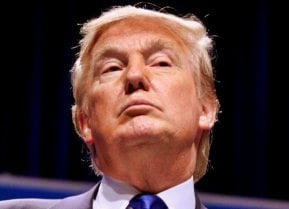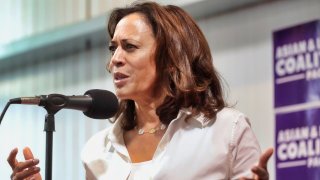The 1 Question America Needs Kamala Harris To Answer
How will Kamala Harris handle the top national security threats facing America today, such as the war in Ukraine? What would her approach be?
In his address to the United Nations, President Joe Biden tried to strike an optimistic note. He stated that Russian President Vladimir Putin’s invasion of Ukraine has “failed” and that “our task, our test, is to make sure that the forces holding us together are stronger than those that are pulling us apart.” But the mounting strife in the Middle East, where Israel and Hezbollah in Lebanon are on the brink of a war that could draw in Iran, offered a somber contrast. As Biden’s presidency draws to a close, he has been unable to stanch the fighting in the Middle East—and a lurch into an all-out war could imperil Vice President Kamala Harris’s presidential prospects.
Donald Trump has steadily been depicting Biden and Harris as on the verge of plunging America into a global conflict. After Biden spoke, Trump sent out an email stating that “World War III is a certainty in a Kamala Harris presidency, President Trump, meanwhile, will restore stability and peace—and it will be peace through strength.” Trump’s boast is that he, and he alone, can bring the wars in Ukraine and the Middle East to a complete and total shutdown. Speaking at the Economic Club of New York on September 5, Trump even seemed to suggest that he would lift economic sanctions on Russia and Iran so as to avoid jeopardizing the preeminence of the dollar as a reserve currency.
Even as Trump declares that all will be well, the more likely prospect is that he will usher in a new age of upheaval by handing over Ukraine to Putin and waffling this past July on America’s commitment to Taiwan. As David Sacks of the Council on Foreign Relations has observed, “Trump is skeptical of the value of U.S. alliances, convinced instead that U.S. allies are free riders that benefit more from the alliance than Washington. If the United States chooses not to defend Taiwan and this prompts allies to take their security into their own hands, he could view such a development as a net positive, as they would be asking less of the United States.”
A new poll from the Institute for Government Affairs suggests that Trump’s message is winning adherents in the swing states. Nationwide voters view Harris as better positioned to handle national security matters by 52 percent to 48 percent. But not in the swing state where he leads Harris by 56 percent to 44 percent. Trump scores better than Harris on dealing with Gaza, Ukraine, and Taiwan. On immigration policy, he surpasses her by 56 percent to 44 percent.
For her part, Harris has been trying to portray Trump as dangerously soft on threats to America. She’s released an ad featuring clips of former national security officials, including John Bolton, Mark Esper, and Mark Milley, denouncing him as a wannabe dictator unfit to serve as commander-in-chief. During her debate against him in Philadelphia, she alleged that with Trump in office, Russian President Vladimir Putin “would be sitting in Kyiv with his eyes on the rest of Europe, starting with Poland.”
To some extent, Harris is trying to have it both ways in Ukraine. For all her denunciations of Trump’s proclivity for mollifying Putin, the reluctance of the Biden administration to allow Ukraine to employ long-range missiles against Russia is itself coming under fire. Today, the Washington office of the Ukrainian-American advocacy organization Razom is holding a rally at 5 p.m. at the White House to urge the administration to allow Kyiv to strike back freely against Moscow. If Harris wants to put some distance between herself and Biden, she might consider addressing the rally.
About the Author
Jacob Heilbrunn is editor of The National Interest and is a nonresident senior fellow at the Atlantic Council’s Eurasia Center. He has written on both foreign and domestic issues for numerous publications, including The New York Times, The Washington Post, The Wall Street Journal, Financial Times, Foreign Affairs, Reuters, Washington Monthly, and The Weekly Standard. He has also written for German publications such as Cicero, Frankfurter Allgemeine Zeitung, and Der Tagesspiegel. In 2008, his book They Knew They Were Right: the Rise of the Neocons was published by Doubleday. It was named one of the one hundred notable books of the year by The New York Times. He is the author of America Last: The Right’s Century-Long Romance with Foreign Dictators.
Image: Shutterstock.com.


